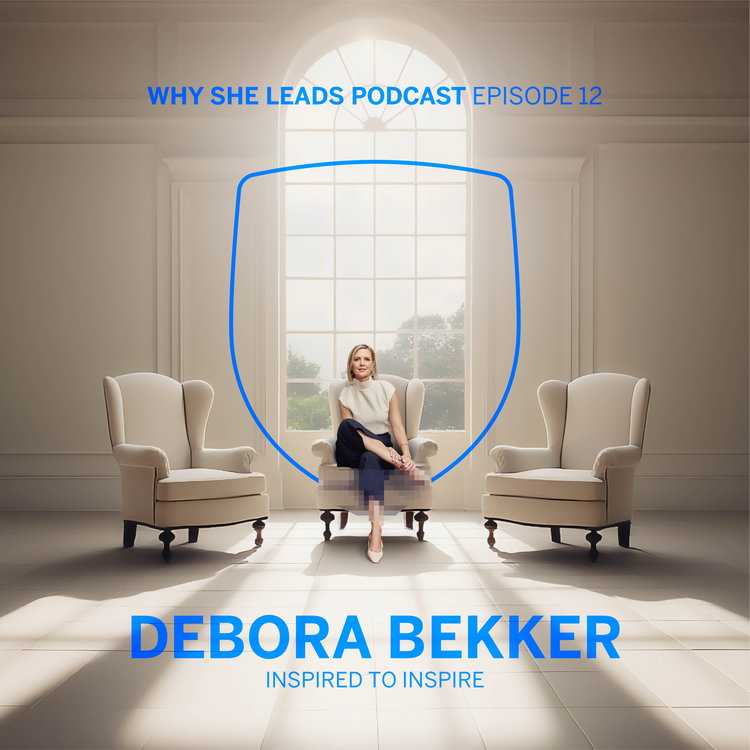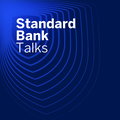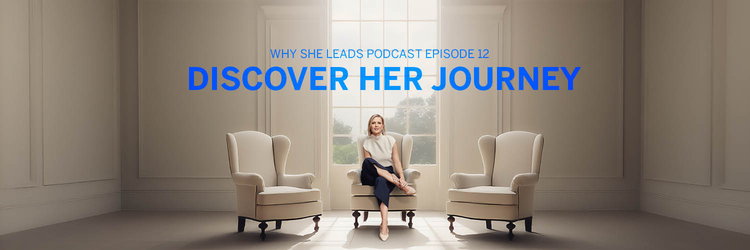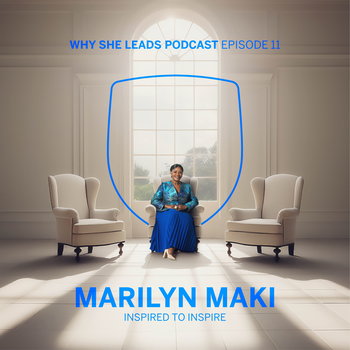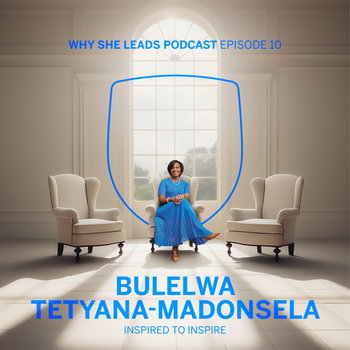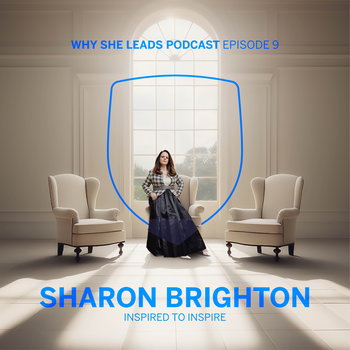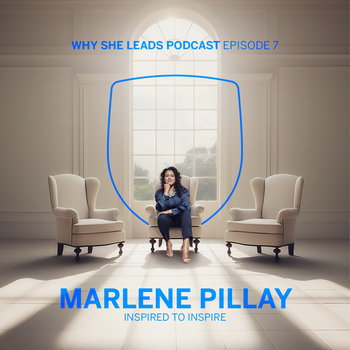00:10:
Hello and welcome to Standard Bank CIB's Why She Leads podcast.
00:14:
My name is Nzinga Kunta and I'm so pleased to be in conversation with women leaders
00:20:
in Standard Bank CIB.
00:22:
We're going to be finding out about their journey to success,
00:24:
the obstacles that were in their path as they make their way and how they got over
00:30:
them and that age-old
00:32:
question, how do you balance your personal and professional life.
00:35:
Joining me today, Debora Becker, the executive of Equity Risk at Standard Bank.
00:39:
Debora, thank you so much for your time on why she leads today.
00:43:
Just take me through how and where you grew up.
00:46:
I grew up on a farm in the Karoo, just south of a town called Doar,
00:53:
some people may know it.
00:55:
And I spent the first six years running wild on the farm before going to boarding
01:02:
school in town.
01:04:
from grade one, from six years old.
01:08:
It was a lovely childhood.
01:09:
I think back with fond memories of everything we got up to.
01:13:
And yeah, I think it was really lovely.
01:18:
What's it like to grow up on a farm?
01:19:
It's amazing.
01:21:
I didn't know anything different, so I didn't know a lot to compare it with.
01:25:
But we were offered a lot of independence from a very, very early stage.
01:32:
because you could play,
01:35:
your play area was much bigger than a kid growing up in the suburbs.
01:40:
We also had loads of friends around on the farm, aside from siblings there were other
01:47:
kids that we played with the whole time.
01:49:
And we then went to boarding school from a fairly young age,
01:54:
where you then again spent a lot of time with friends.
02:01:
At that point, we were already taught or had to learn how to balance everything,
02:07:
how to make sure you do your homework at a very young age while also trying to make
02:14:
time because the friends are playing outside and having
02:16:
loads of fun.
02:18:
So it was a really, really lovely experience.
02:19:
And so I'm sure that that discipline that you're learning as a child, studying in
02:26:
boarding school,
02:28:
also helped when you were older with your law degree, with your economics degree and
02:30:
your career as well.
02:32:
It definitely did.
02:34:
I think knowing which responsibilities to take full ownership of was really
02:38:
important
02:40:
to learn from that age and going to university you knew you had one shot at
02:46:
this and
02:48:
you had to make it work.
02:50:
So
02:52:
I did that and what it helped is that my father also made us aware that he'll
02:57:
fund our studies but at the beginning of a year and you had to figure out how you're
03:03:
going to make it
03:05:
that funding work throughout the whole year and and if you
03:07:
failed a subject and had to do a few extra years that was probably up to luckily i
03:14:
didn't have to have to test it but
03:16:
um you had to figure out how to find that yourself so um that responsibility was was
03:21:
one that i felt heavily it sounds like although you were independent your parents
03:28:
or
03:30:
your father had quite a big influence on you growing up?
03:31:
My parents definitely did, yeah, both of them.
03:35:
Through the way they enabled us to pursue whatever we enjoyed or were interested in.
03:45:
Being in boarding school, you didn't see them as often as other kids see their
03:52:
parents,
03:52:
but I always felt I had their support and that with their backing, I can achieve
03:59:
whatever I aimed for.
04:01:
You speak about your parents making you see that you can do whatever you want,
04:05:
essentially,
04:07:
and seeing that not confining you maybe to gender roles.
04:10:
Just tell me about that.
04:11:
That's a bit tricky because where I'm from,
04:14:
a lot of my peers are now probably in more traditional household roles,
04:22:
maybe stay-at-home moms, farmer's wives, and so on.
04:26:
And my parents would have been okay if that was me as well.
04:29:
if that was my choice.
04:30:
But they also, I think, knew after studying that that was probably not where
04:36:
I was going to end up.
04:39:
I also have an older sister who had a similar career path to mine and she's just
04:46:
one year ahead of me, so she paved the way for a lot of things.
04:52:
And then seeing her do things made me realize, well, it can be done as well.
04:58:
Beautiful.
04:59:
And so we're speaking about influences in your personal life, in your professional
05:04:
life.
05:06:
Tell me about some of the women or people that also made you think like that.
05:11:
When I joined Standard Bank, it was on the grad program.
05:15:
So I've only really seen female leaders in this group.
05:21:
And it was a pretty spectacular group of women that I've been...
05:28:
privileged to see and follow and some of them I've been close to like Annarie
05:34:
Cornelissen, there's another lady Mina Toxos who is based in
05:41:
London and I spent some time there with her as well.
05:44:
She's absolutely amazing and Mina also spoke to me some to some extent about
05:50:
work-life balance and
05:52:
how she was managing children while building her career.
05:57:
and it was just wonderful to have somebody who speaks so freely and openly about it
06:03:
and share those views with me and that was way before I had any
06:05:
kids.
06:07:
Those were people I had personal relationships with but there are other
06:09:
women in the bank that
06:11:
I just looked up to at different points in my life and thought if they can make this
06:16:
work
06:17:
I can also do it.
06:20:
Yeah somebody like Jill van Velden when I was just a grad she was head of credit for
06:25:
South Africa I think.
06:27:
Sune Bruggeman was chief risk officer at some point.
06:31:
Just to name a few, yeah.
06:34:
Okay, let's hear from someone who's influenced you or who's had a role in your
06:39:
career at some point.
06:41:
Hi all.
06:43:
I used to work with Deborah in the last few years of my career with Standard Bank
06:48:
ending in
06:50:
2011. There's a few things that I want to say about Deborah in terms of her
06:54:
leadership.
06:55:
capabilities.
06:56:
She joined my team in country risk around
07:01:
2008-2009 when it was quite a tumulus time for the country's team because we
07:07:
tried to engineer the value add that countries could have to the group whereas
07:14:
previously it was
07:16:
purely an economic analysis and put it out there.
07:20:
not linking to the strategy, not linking to the transactions that's in motion, what
07:27:
the risk presents,
07:29:
etc.
07:31:
I try to transform the country's team to add more value.
07:33:
Come in, Debra.
07:35:
She was fresh.
07:37:
She was new.
07:38:
She was inexperienced.
07:39:
She was really not, you know, like the old god within country risk.
07:45:
And she embraced the new strategy from day one.
07:50:
I think what was important for me is when I look at people for leadership positions
07:56:
early on,
07:58:
I look at people who are quite interested to be a leader without a title.
08:02:
In other words, influence the people around them without having the title and
08:08:
dealing with the
08:10:
difficulties that come their way.
08:11:
So come around, Debra, from day one,
08:13:
she embraced the new strategy that was resisted by some of the older guard.
08:19:
members, if I can put it like that.
08:22:
She spent an immense amount of time to try and influence the members around her to go
08:28:
along with the new
08:30:
strategy.
08:32:
And she actually managed to influence quite a few of the members positively
08:36:
around that.
08:38:
And that talks to me, I mean, she was a junior member coming into the team, you
08:41:
know,
08:41:
to achieve that talks to me to be a leader without a title, Number one.
08:47:
Number two, there was...
08:49:
an incidence or two where she was subjected to quite negative feedback
08:56:
from the members in the team.
08:58:
I think a lot of people would have backed off from that.
09:02:
Did she back off?
09:03:
No, she did not.
09:04:
Did she retaliate?
09:06:
No, she did not.
09:07:
She dealt with it in such a mature way that really impressed me on day one.
09:13:
So she de-escalated the situation from day one.
09:17:
and gave the members who were basically attacking her personally,
09:23:
exposing herself to them and defend the situation and work for a better way
09:29:
forward for the team
09:31:
to be a more value-adding kind of thing.
09:33:
I will never forget that because she did much of that on her own.
09:38:
She did need some support, but it wasn't like she ran for the leadership.
09:43:
She stepped into that leadership position.
09:46:
And eventually she did win them over.
09:49:
And for me, that's a great thing.
09:50:
So for me,
09:51:
the two things that I can take away from Deborah's ethos is she's happy to be a
09:58:
leader
09:58:
without a title.
09:59:
She might not have the title, but she's happy to step into that leadership
10:03:
position.
10:05:
And I think that paid off well.
10:06:
And secondly, the mature way that she dealt with very adverse feedback,
10:13:
controversial,
10:15:
hostile situations was very mature, not retaliating.
10:19:
And I think at the end of the day, the benefit that the country's team up until
10:25:
today, I think,
10:27:
got from that, her leadership style.
10:29:
whether she had a title or not, is immense.
10:33:
Deborah, I'm not surprised that you got where you are now.
10:37:
You should be very proud of yourself and well done.
10:41:
I mean, I really admire you.
10:43:
Thank you.
10:44:
Oh, that's very sweet.
10:45:
That's so nice.
10:46:
It's amazing, eh?
10:48:
How do you feel listening to feedback like that about yourself?
10:51:
Really good.
10:52:
I mean, it is inspiring to listen to that again and realise I've gone through stuff
10:58:
that I can't even recall.
11:00:
in the past so it's it's wonderful to know that doing the right thing is it is
11:06:
important
11:08:
and other people sees it
11:13:
what would you have wanted someone to tell you at the beginning of your career what
11:18:
you wish you had known i
11:20:
think a very important thing is to focus on what you're busy with because the best
11:25:
way you can prepare you
11:27:
yourself for where you're going to next is by doing what you're doing right now as
11:32:
well as possible.
11:34:
You can think about opportunities that lies ahead in the future.
11:35:
That's, and we all do it the whole time.
11:37:
But I do think it's really, really important to focus,
11:43:
to be good at where you are right now and try to do that as best as possible.
11:47:
I mean, it's now taken for granted that you are excellent, not just good at what
11:52:
you do right now.
11:54:
And I've been told that you almost know, you know, what a good...
11:56:
deal is you can you can see things can you just take us through what guarantees a big
12:03:
deal or a good
12:05:
deal maybe through a risk analysis lens or just do you have a feeling about something
12:10:
or is it more clinical
12:12:
than that so in the country of space maybe to give a bit more background where i
12:17:
worked before
12:20:
we took big picture views for the bag we'd look at
12:27:
what the bank's portfolio across the continent looks like and where the risks
12:34:
lie in that portfolio.
12:36:
Good deals from a risk perspective looks different from a business perspective
12:42:
because you want a
12:44:
structure that you can see will remain in place for five years time and you're not
12:49:
going to get worried about where.
12:51:
I think the business team often looks at very key clients that they hope to attract
12:54:
for the bank.
12:56:
or continue banking.
12:58:
And often that causes some friction between us and the business team, but it's
13:02:
a healthy friction.
13:04:
How do you deal with that?
13:06:
In as open and honest a way as possible.
13:09:
So try to identify exactly what the concern is and
13:16:
communicate that as clearly as possible to the business team.
13:22:
And then if you ever realize that...
13:24:
there is something that you were wrong about admit it and acknowledge it um yeah
13:31:
i
13:33:
would say that resonates for both a professional and personal career if you
13:38:
find out that you're wrong about something you just
13:40:
not easy though it isn't easy but i think it's absolutely it's important because you
13:45:
um what we're doing here is not
13:47:
about ourselves it's a transaction that you do that affects the
13:49:
group as a whole and if you are proud in the decision you made and refuse to
13:54:
overturn that.
13:56:
it has an impact on something bigger than just yourself.
14:01:
I know you work across the continent, as does the bank, and so you must pick up
14:08:
things both professionally and personally that you
14:10:
think you'd like to either explore more, work more on, or contribute to.
14:15:
So as I mentioned, I mean, I moved from this big picture role to where we now are.
14:20:
I think over the longer term, In my career,
14:23:
I definitely want to move back into that space where I have a bigger influence in
14:30:
the portfolio
14:30:
management of the bank and the strategy, the biggest strategy of the group,
14:36:
which is what we did in my country, Risk Time.
14:38:
So that's something I'd definitely like to move back towards.
14:43:
And the importance of people seeing someone that looks like you in a
14:49:
leadership role what do you think that is
14:51:
yeah i mean that's it's it's very important.
14:54:
It's the Sia Khaleesi effect that we see in the rugby where young kids see
14:59:
a captain and it's it's sometimes people seeing somebody who looks like you in a
15:06:
leadership role but it's
15:08:
also people seeing somebody who's not like them in a leadership role what if someone
15:13:
is watching
15:13:
you now and saying you know i'd
15:15:
like to be like that how are they going to get their what they need to remember as
15:22:
they go on that journey
15:24:
i think it's part of it's going back to
15:29:
to what I said I tell my younger self as well.
15:31:
It's really focus on where you are now.
15:34:
You can achieve it, right?
15:36:
But focus on where you now work hard on and be really good at what you're doing
15:41:
right now
15:42:
because that is what you, that is what will set you up for your next role.
15:49:
We were chatting off camera about our families and our kids and our upbringings
15:55:
as well.
15:57:
And I'm just wondering how difficult is that?
15:58:
to balance?
15:59:
People don't like that question.
16:00:
They don't like it being asked, especially to women,
16:02:
but I think it's important because as you're successful in your professional
16:08:
life,
16:10:
there must be a balance or a give and take.
16:11:
Tell me about that.
16:11:
It's definitely not easy.
16:16:
I had to carefully consider whether I want a family or not because I also wanted a
16:23:
career.
16:24:
And now I've got two lovely boys which I'm very very happy to have.
16:28:
But it is a juggle, right?
16:33:
I've got people asking me quite often,
16:36:
and I prefer it if people talk fairly openly about how easy or difficult it is.
16:42:
I think the most important thing is that women should not try to achieve at work
16:49:
the same thing
16:51:
as men without having the same kind of support system at home,
16:53:
because it increases the stress that you need to deal with.
16:58:
it's not a level playing field right if i have to take full responsibility for
17:05:
everything at home and then try to
17:07:
build my career um i will burn out very very quickly um so some
17:12:
you need to find something my husband always reminds me that you can do almost
17:19:
anything but you can't do
17:21:
everything try aim for those things that you want to achieve and decide what it is
17:26:
that you need to compromise
17:28:
and that's kind of how I live my life at the moment.
17:32:
There are things that you miss out on sometimes and then there are other things
17:38:
that
17:38:
I really prioritise in my personal life that's just really important to me as
17:42:
well.
17:44:
What's the best thing about the work that you do?
17:46:
It's the people around me, right?
17:48:
It's people that makes work fun.
17:54:
Working with diverse people, working with really, really intelligent people.
17:57:
people.
17:59:
And then it's the nature of the work, the complexity around it, and learning new
18:05:
things the whole time.
18:07:
So part of this thing of balancing work-life is that
18:12:
I often don't have time to read as much as I would like to or to study further
18:19:
because right now in my
18:21:
life I'm just not in a space where I can do it.
18:21:
But at work it's amazing because I'm forced to learn new things the whole time.
18:27:
And that's what makes my life really, or my work life really, really enjoyable.
18:32:
It seems like there's an underlying purpose to the work as well.
18:37:
It's not just, okay, hi, we need to make money and there's how much we need to make
18:43:
and let's wrap it up.
18:45:
Just take me through a little bit of that.
18:47:
Yeah, I guess, well, specifically Standard Bank is different from other banks,
18:51:
given that we've got this deliberate strategy on the continent.
18:54:
where we aim to drive Africa's growth.
18:59:
And knowing that you're part of this bigger purpose is really important.
19:05:
It does matter rather than just trying to do it for financial gain.
19:10:
I mean, the money is also important.
19:12:
You are a bank, but it's that underlying importance of the purpose and why you're
19:17:
doing it.
19:18:
Deborah, Rebecca?
19:19:
The executive equity risk at Stana Bank.
19:21:
Thank you so much for your time today.
19:23:
It was really good to get to know a little bit about you, your journey, your
19:27:
progression.
19:28:
And really, thank you so much for the lessons that you shared.
19:30:
Thank you.
19:31:
Thank you for having me.
19:32:
It was lovely to be here.
